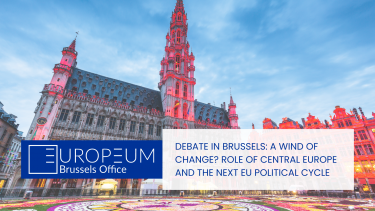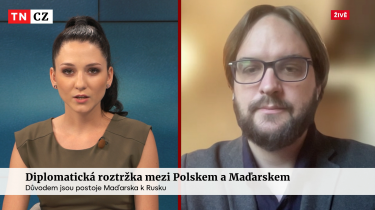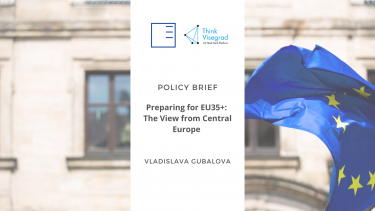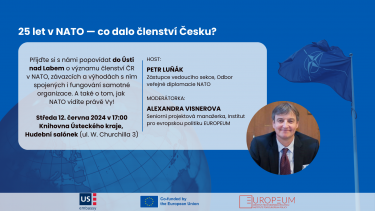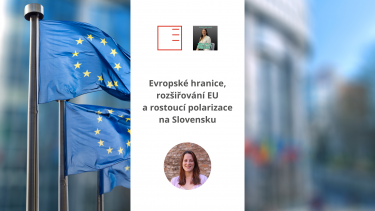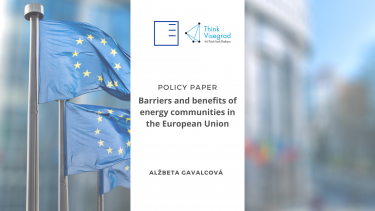Debate in Brussels | A wind of change? Role of Central Europe and the next EU political cycle
As the dust settles after a hectic period of post-election negotiations, Von der Leyen’s second Commission is faced with serious economic challenges. Recent reports of Draghi and Letta have clearly indicated that the EU is lagging behind other global powers in the areas of growth and competitiveness and this is reflected in the composition of the College as well as within strategic priorities for the next political cycle. Come listen and debate about challenges EU is facing!
Show more
TN.cz | Rift between Hungary and Poland. Reason being Orbán's relationship with Putin
A diplomatic rift has erupted between Budapest and Warsaw over the different attitudes of the two countries towards Russia. First, Hungarian Prime Minister Viktor Orbán branded Poland as the country with the most hypocritical policy in Europe, while the Poles hit back by pointing out the close relations Orbán maintains with Russian President Putin. The media are also talking about the possible end of the V4 group. EUROPEUM Institute researcher Vít Havelka spoke more about the dispute in an interview with TN.cz.
Show more
Policy Brief | Preparing for EU35+: The View from Central Europe
Despite the historical support of EU enlargement policy by the Visegrad Four (V4), these Central European states are now faced with the challenge of reconciling their stances with the new realities of the process. As Ukraine and Moldova opened their accession negotiations, the EU seems to be torn on the questions associated with the future enlargement(s) - institutional reforms and changes within the EU budget. Transitioning from economic beneficiaries to potential contributors, the V4 states must evaluate the potential political and economic impacts of new members on both the EU and their domestic levels. Writes and proposes recommendations Vladislava Gubalova from GLOBSEC.
Show moreDebate: 25 years in NATO - what has membership given to the Czech Republic?
We invite you to the second regional debate within the 25th anniversary of the Czech Republic's accession to NATO! Membership has brought benefits to the Czech Republic, but it also comes with a number of obligations. What is the importance of this alliance for us? And what do you think about NATO? Come to Ústí nad Labem to discuss these and other questions.
Show more
Timpul Prezent | European borders, EU enlargement and growing polarization in Slovakia
What are the borders of Europe and how do they coincide with the borders of the European Union? What are the prospects for EU enlargement towards the Western Balkans and the former Soviet states? These questions are addressed by Jana Juzová, senior researcher at EUROPEUM Institute for the Timpul Prezent podcast. She also discussed the consequences of the recent attack on Slovak Prime Minister Robert Fico and highlighted the growing polarization of Slovak society and the potential threat to media independence.
Show morePolicy Paper | Barriers and benefits of energy communities in the European Union
Energy communities are an effective means to decentralize and renew our energy systems with sustainable solutions as they are usually based on renewable energy. They have already started emerging in 1970´s, yet there has been a significant increase in their development only in recent years, also in terms of their introduction into the EU legislation. Especially in Western and Northern European countries the concept already enjoys vast popularity. On the other hand, in Central and Eastern European countries (further referred to as CEE) energy communities are only beginning to emerge. The policy brief (based on literature and interviews with various stakeholders ) examines the benefits energy communities may bring, and more importantly, the main obstacles remaining in their way for greater evolution in the CEE region – and especially Visegrad countries (V4). As these initiatives progress, sharing the best practices will ensure the success of the community energy in the energy transition. Writes Alžbeta Gavalcová.
Show moreThink Visegrad Fellowship offer: Call for proposals 2024
The Think Visegrad platform, which brings together think tanks from the Visegrad countries, including the EUROPEUM Institute for European Policy, is offering eight visiting fellowships to non-Visegrad expert fellows for the period Summer/Autumn/Winter of 2024. The duration of fellowships varies from 6 to 8 weeks (based on agreement with the hosting institute).
Show moreTN.cz | Meeting of the Visegrad Group Foreign Ministers
The current format of the Visegrad Group lacks common topics; the group fragmented into two pairs that have different opinions in many areas, particularly regarding the issue of Ukraine. However, the interests of Hungary and Slovakia are not in conflict with others, despite what their leaders claim. The conflict in the Middle East, where the Czech Republic is in the minority in its full support of Israel, was also discussed on this meeting. Viktor Daněk, deputy director of EUROPEUM Institute, commented on the situation within the V4 for TN Live.
Show moreVisegrad/Insight | Tractors Trending: V4 Populists Appropriate the Farmers’ Protests Ahead of the EP Elections
The populist camps in the Visegrad Four countries have used the farmers' protests in their populist campaigns for the European Parliament elections in June. A fundamental change to the last EU elections in 2019 is visible in the politicians' messages towards the people, with social media taking over the classic platforms such as television, press or radio. Project Manager of Global Europe programme at EUROPEUM Institute, Oszkár Roginer-Hofmeister, wrote an article on this topic for Visegrad/Insight.
Show more
ČRo Plus | Czech government opposition reaction to EU migration pact
The EU Migration Pact has long been the subject of heated debate between the Czech government and the opposition. From the latter there are opinions that it is a monstrous agreement masking refugee quotas or fears that illegal migration will destroy the Czech Republic. But the government says it is a step in the right direction, despite the Czech Republic's abstention in the vote on the pact. Viktor Daněk, deputy director of the EUROPEUM Institute, commented on the change of their position for ČRo Plus.
Show moreStaroměstské náměstí 4/1
Prague 1 - Staré Město
110 00
tel.: +420 212 246 552
email: europeum@europeum.org
https://www.europeum.org
